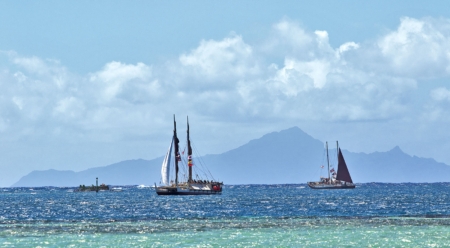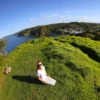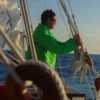Mālama Honua: Hōkūle‘a’s Voyage of Hope
Part 6, Tahiti
Patagonia Books is honored and excited to announce the official release of Malama Honua: Hokule’a – A Voyage of Hope by Jennifer Allen, with photographs by John Bilderback. This beautiful hardcover book chronicles the worldwide voyage of Hokule’a, the double-hulled canoe that is only sailed using ancient wayfinding techniques. Please enjoy the following excerpt from chapter 10 then visit patagonia.com or your local bookstore to read the full story of this incredible vessel and its compassionate crew.
When the sky widens and the sails snap open, the “you” that is “I” becomes “we.” “It’s not about me, or you, it’s about everybody,” explains Snake. “We are here to help each other and watch over each other.”
So when Gordon tells Pomai, “Your father is here, he’s with you,” you know her father is with all of us, too. We all carry someone with us. Nakua Konohia-Lind has his great-grandfather Sam Kalalau Sr., who sailed with Billy and John in 1976. Gordon has his father, Abraham, a former master mariner who once walked barefoot across a path of burning stones in a ceremony on Mo‘orea en route to Taputapuātea in 1992. Kainoa carries his late wife, Patricia, with him, wearing the red knitted cap she made for him only a year ago. And then there is Zane. Zane is carrying Eddie, his uncle. Eddie is carrying Zane. They are carrying each other.
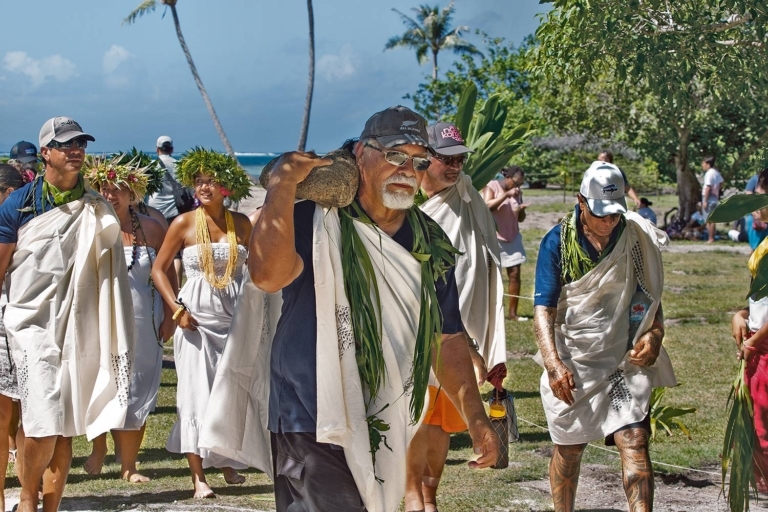
John Kruse, who helped build Nāmāhoe, a seventy-two-foot double hull voyaging canoe from the island of Kaua‘i, bears a pōhaku at Taputapuātea. Photo: John Bilderback
The names of nā ‘aumākua are listed on a wood plaque at the stern, a reminder of those who once stood on this deck, but have passed, and who still watch over us now, sometimes in the form of sharks, dolphins, birds, rainbows, and even clouds. A recent name added to the list is Mel Paoa. Mel shares the surname of the last great Hawaiian navigator, Paoa, and he also kindly shared his soup in the rain in Aotearoa. Mel passed away suddenly at home in Moloka‘i in August 2015. His passing was felt by all who sailed with him, most especially by his friend Kawika Crivello, also from Moloka‘i, the watch captain today. Kawika tells the story of when the canoe crossed the Atlantic only months after Mel’s passing. Mel’s son Lohiao was on board, and on the day of Mel’s birthday a noio bird flew around the canoe, and all Lohiao had to do was offer his hand, and the bird landed right on his finger and stayed a while. Everyone knew this bird was an ‘aumakua of Mel visiting his son.
Stories like these unfold like waves rolling from one side to the other, rocking us in the shared dream of remembering.
We pour water for the uncles, and the uncles show us how to mālama pono, take good care, of each other. If there’s someone not feeling so well, get her a damp towel. If someone is tired, let him sleep. If someone is drifting, thinking, then give her the space. Someone missing someone, maybe there is a song to help the memory unfold. Singing, like salt water, heals. These are the lessons in taking care and then there are lessons in being fully maka‘ala, awake. Those lessons are taught especially by Snake.
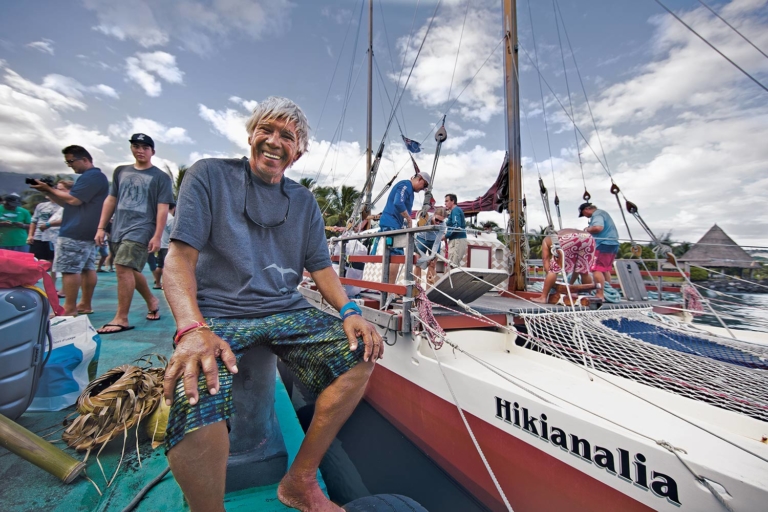
Veteran crewmember ‘Snake’ Ah Hee pauses on the dock before departure to Ra‘iātea. Photo: John Bilderback
“If you love the ocean, the ocean will help you,” Snake explains. A lifelong surfer, paddler, and sailor, Snake is fluent in language of the sea. “The ocean is helping you put everything together, the ocean and the waves. If you don’t understand the waves, you’ll be lost.”
“You got to be constantly watching. Look in the front, look in the back,” he says. “It’s almost like you’re surfing, surfing downwind with the waves.”
The canoe surfs along, sometimes smoothly, sometimes roughly. As Pomai would say, “Like a shark, the bow, the nose; the stern, the tail; the mast, the fin.”
As the sun slowly slips down the sky, the winds shift. Sails are lowered, raised, changed, and then for a while things seem to reach a lull. There are squalls, sure, over there, far off, but for now ‘Ōnohi pulls out the guitar and strums while Pomai sings and Nakua softly drums the water jug. And then it comes. Like an earthquake is heard before it is felt. It comes in the sound of the sails and the boom suddenly whipping back and everyone springing up, some to hold the boom open, some to hold the sweep. It comes, full force.
Rain. Straight down. Sideways. Sun so low the rain is a blinding silver shine on the water all around. Gordon summons you, and you come stand beside him and hold the boom while someone else holds the other side. The rain seems to calm the waves to settle down. Sometimes nature seems to talk to itself and right now you are here to witness it.
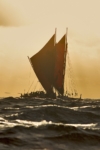
Hōkūle‘a on the road to Taputapuātea. Photo: John Bilderback
And there you stand, Gordon and you in the shelter of the sail. Story time. Gordon talks, talks of how far the voyage has come since the days when he and Dave Lyman were selling books and T-shirts out of the back of Dave’s Volkswagen to raise money to help maintain the canoe. When the deck was bamboo and when Herb Kāne would call in the middle of the night to ask you, “Hey, can you bring the canoe home from Tahiti?” A long way since those days when after sailing the canoe home, you simply wake up the next morning and return to work. No big show. Just doing your job, really.
Gordon is asked if he and his crewmates, in sailing the canoe back then, in reclaiming their language and culture, felt they were staking the spear in the ground and taking back what was once stolen, saying, “This is ours!”
Gordon pauses. He looks out over the waters for a good long while. “Hōkūle‘a wasn’t a stake in the ground,” he says. “Hōkūle‘a was removing the stake from our hearts.”

NOW AVAILABLE
Mālama Honua: Hokule’a – A Voyage of Hope
This beautiful hardcover book chronicles Hōkūleʻa’s epic mission to nurture worldwide sustainability. Interwoven with descriptions of Hōkūleʻa’s experiences in port are the voices of the master navigators and crew members, who guide the ship along the ocean’s trackless path, and the local pioneers—scientists, teachers, and children touched by Hōkūleʻa—who work tirelessly to weather the many environmental challenges of our modern lives. 320 pages, with full-color photographs throughout.
